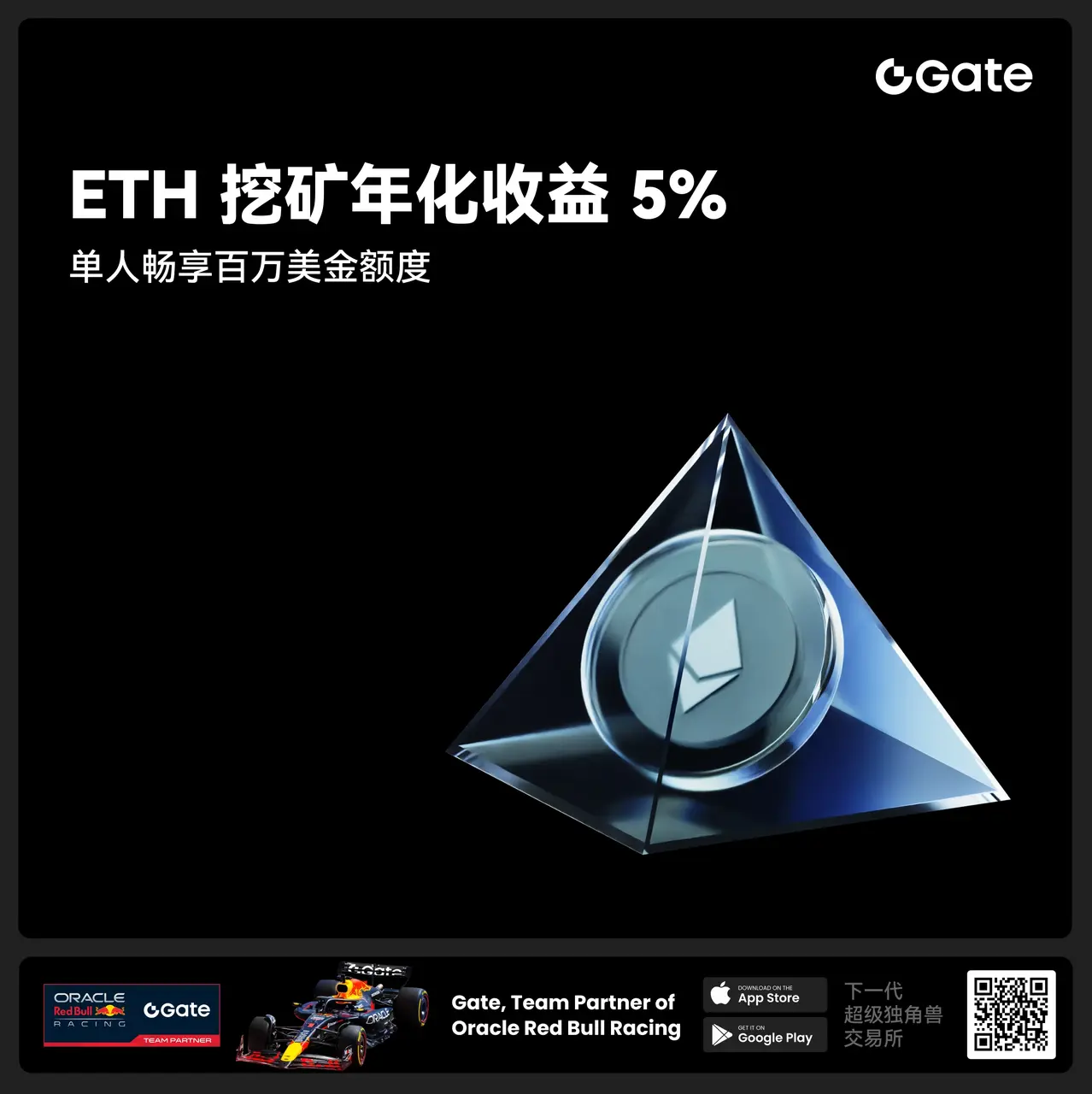- 話題1/3
19k 熱度
37k 熱度
21k 熱度
6k 熱度
174k 熱度
- 置頂
- Gate 鏈上賺幣:ETH 挖礦限時高收益!
✅ 年化收益近 5% + 額外獎勵單人額度 1000 ETH
💎 最低 0.00000001 ETH 起投,無贖回期,隨存隨取!
立即上車,穩賺鏈上收益:https://www.gate.com/staking/ETH
- Gate 合約開倉激勵計劃火熱上線!零門檻瓜分 50,000 ERA
開倉即有獎,交易越多獎勵越多!
新用戶享 20% 加成!
立即參與:https://www.gate.com/campaigns/1692?pid=X&ch=NGhnNGTf
活動詳情:https://www.gate.com/announcements/article/46429
#Gate # #合约交易 # #ERA#
- 👀 家人們,最近你們都攢了多少 Alpha 積分啦?
空投領到了沒?沒搶到也別急,廣場給你整點額外福利!
🎁 曬出你的 Alpha 收益,咱們就送你$200U代幣盲盒獎勵!
🥇 積分最高曬圖用戶 1 名 → $100 代幣盲盒
✨ 積分榜前五優質分享者 5 名 → 各得 $20 代幣盲盒
📍【怎麼玩】
1️⃣ 帶上話題 #晒出我的Alpha积分收益# 發廣場貼
2️⃣ 曬 Alpha 積分截圖 + 一句話總結:“我靠 Gate Alpha 賺了 ____,真的香!”
👉 還可以分享你的攢分技巧、兌換經驗、積分玩法,越乾貨越容易中獎!
📆【活動時間】
8月4日 18:00 - 8月10日 24:00 (UTC+8)
- 🎉 #CandyDrop合约挑战# 正式開啓!參與即可瓜分 6 BTC 豪華獎池!
📢 在 Gate 廣場帶話題發布你的合約體驗
🎁 優質貼文用戶瓜分$500 合約體驗金券,20位名額等你上榜!
📅 活動時間:2025 年 8 月 1 日 15:00 - 8 月 15 日 19:00 (UTC+8)
👉 活動連結:https://www.gate.com/candy-drop/detail/BTC-98
敢合約,敢盈利
- 🎉 攢成長值,抽華爲Mate三折疊!廣場第 1️⃣ 2️⃣ 期夏季成長值抽獎大狂歡開啓!
總獎池超 $10,000+,華爲Mate三折疊手機、F1紅牛賽車模型、Gate限量週邊、熱門代幣等你來抽!
立即抽獎 👉 https://www.gate.com/activities/pointprize?now_period=12
如何快速賺成長值?
1️⃣ 進入【廣場】,點擊頭像旁標識進入【社區中心】
2️⃣ 完成發帖、評論、點讚、發言等日常任務,成長值拿不停
100%有獎,抽到賺到,大獎等你抱走,趕緊試試手氣!
截止於 8月9日 24:00 (UTC+8)
詳情: https://www.gate.com/announcements/article/46384
#成长值抽奖12期开启#
Polymarket 神祕巨鯨大贏 5000 萬美元,他如何正確預測大選結果?
在鏈上賭盤平台 Polymarket 的興起下,許多人開始利用這些工具預測選舉結果。本文探討一位神秘交易員如何成功押注川普勝選,並且獲利近 5000 萬美元。本文源自 Alexander Osipovich文章,由 PANews 整理、編譯。 (前情提要: Polymarket 神準預測!川普當選機率一路領先,總統大選賭金破36億美元) (背景補充: 川普5大「搖擺州全領先」已拿下北卡羅來納!狗狗幣大漲30%突破0.2美元) 這位被稱為 「川普鯨魚」 的神祕交易員在進行了一系列與總統大選有關的大膽押注後,預計將獲得近 5000 萬美元的利潤。 他不僅認為川普會贏得總統大選,還押注川普會贏得普選 —— 許多政治觀察家認為這一結果不太可能。這位自稱 「Théo」 的交易員還押注川普會贏得賓夕法尼亞州、密歇根州和威斯康星州等 「藍牆」 搖擺州。 現在,Théo 即將獲得鉅額回報。他使用四個匿名帳戶在加密預測平臺 Polymarket 上下注。儘管他拒絕透露自己的身份,但自從 10 月 18 日的一篇文章引起人們對他的賭注的關注以來,他一直在與《華爾街日報》的一名記者保持聯絡。 在數十封電子郵件中,Théo 表示,他的下注本質上是對民調資料準確性的下注。他自稱是一位富有的法國人,曾在多家銀行擔任交易員,他告訴《華爾街日報》,他從今年夏天開始運用自己的數學知識來分析美國民調。 他認為民調誇大了副總統賀錦麗的支持率。與大多數紙上談兵的政治評論員不同,他言出必行,押注川普獲勝的金額超過 3,000 萬美元。 週二晚上,選舉結果陸續出爐,Théo 心情十分愉快。他說,他在法國半夜醒來檢視選舉結果。 川普在佛羅里達州的強勁表現預示著他在普選中獲勝的希望很大,他寫道:「我對我的下注感到非常高興和有信心!」 在選舉日前發給記者的私信中,Théo 預測川普將獲得全美 49% 或 50% 的選票,擊敗賀錦麗。他還預測川普將贏得七個戰場州中的六個。 截至週三下午,分析師預測川普將贏得普選,川普將獲得近 7200 萬張選票,而賀錦麗獲得 6710 萬張選票,儘管加州和其他州還有數百萬張選票尚未統計。博彩市場認為川普贏得普選幾乎是板上釘釘的事。 博彩市場顯示,川普還有望贏得所有七個搖擺州。週三,認為賀錦麗可能獲勝的密歇根州被預測為川普獲勝的州。 《華爾街日報》已證實,Théo 是 Polymarket 巨鯨帳戶背後的交易員,這些帳戶系統性地購買了川普獲勝的賭注。Polymarket 證實了他的部分說法,稱這些賭注背後的人是一名法國人,擁有豐富的交易經驗和金融服務背景。 Théo 表示,他用自己的錢押注川普,目的是賺大錢,而且他 「絕對沒有任何政治目的」。《華爾街日報》無法確定這些說法是否屬實。《華爾街日報》也無法排除 Théo 與任何政治組織或川普盟友之間的聯絡。 在他的電子郵件和與記者的 Zoom 對話中,Théo 多次批評美國的民意調查。他特別批評主流媒體進行的民意調查,在他看來,這些民意調查偏向民主黨,往往會產生有利於賀錦麗的異常民意調查結果。 「在法國,情況就不同了,民意調查的可信度更重要:他們希望結果儘可能接近實際。文化在這方面有所不同,」 他寫道。 Théo 分享了一張根據 RealClearPolitics 民意調查平均值編制的數位表,該表顯示川普在 2020 年的搖擺州民意調查中表現優異。考慮到 2024 年搖擺州的民意調查結果十分接近,Théo 推斷,如果川普能有類似的出色表現,他將很容易取得領先。 Théo 表示,民意調查未能解釋 「害羞的川普選民效應」。Théo 寫道,要麼是川普的支持者不願告訴民意調查員他們支持這位前總統,要麼是他們不想參與民意調查。 為了解決這個問題,Théo 認為民意調查人員應該使用所謂的鄰居民意調查,即詢問受訪者他們預計鄰居會支持哪位候選人。這個想法是,人們可能不想透露自己的偏好,但在被要求猜測鄰居計劃投票給誰時,他們會間接透露自己的偏好。 Théo 引用了 9 月份公佈的幾份民意調查結果,這些調查使用了鄰居投票法和傳統投票法。這些民意調查顯示,當受訪者被問及鄰居會投票給誰時,賀錦麗的支持率比直接詢問他們支持哪位候選人的結果要低幾個百分點。 對 Théo 來說,這證明民調機構再次低估了川普的支持率。這些資料幫助他下注,認為川普將贏得普選。Théo 下注時,Polymarket 上的投注者認為川普贏得普選的機率不到 40%。 當西奧在選舉之夜慶祝選舉結果時,他透露了自己押注成功的另一部分分析。在一封電子郵件中,他告訴《華爾街日報》,他委託了一家大型民意調查機構進行調查,以衡量鄰居效應,但他拒絕透露這家機構的名字。他寫道,調查結果 「令人震驚,有利於川普!」 Théo 拒絕分享這些調查結果,稱他與民意調查機構達成的協議要求他對調查結果保密。但他辯稱,美國民意調查機構在未來的調查中應該使用鄰居法,以避免再次出現令人尷尬的失誤。 Théo 表示:「如果最新的民意調查衡量了鄰居效應,輿論就會更加明朗。」 相關報導 華爾街大鱷 Bernstein:無論誰當選美國總統,比特幣將在2025突破20萬美元 川普宣布當選演講全文:我愛馬斯克、他是巨星誕生,讓美國人再次偉大 科普》美國選舉人票制是什麼?川普拿下賓州、密西根州就當選 〈Polymarket 神祕巨鯨大贏 5000 萬美元,他如何正確預測大選結果?〉這篇文章最早發佈於動區BlockTempo《動區動趨-最具影響力的區塊鏈新聞媒體》。